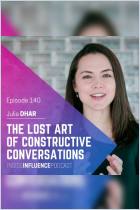
Article
Why listening well can make disagreements less damaging
Offering undivided attention and curiosity not only lowers the temperature of a conversation but can change its outcome
Psyche,
2024
Read offline
résumé audio créé automatiquement
1×
Connectez-vous pour écouter un résumé audio.
résumé audio créé automatiquement
Recommendation
If you’ve ever been entrenched in a bitter war of words with no exit in sight, you’ll welcome this timely solution from social psychologist Guy Itzchakov. He encourages squabblers locked in a stalemate to listen to one another attentively instead of hastily making counterargument after counterargument. Itzchakov’s thoughtful research-based proposal aims to de-escalate interpersonal tensions and create an environment conducive to constructive dialogue.
Summary
About the Author
Social psychologist Guy Itzchakov is an associate professor in the Department of Human Services at the University of Haifa, Israel.
Learners who read this summary also read
Book
Podcast
Book
















Comment on this summary